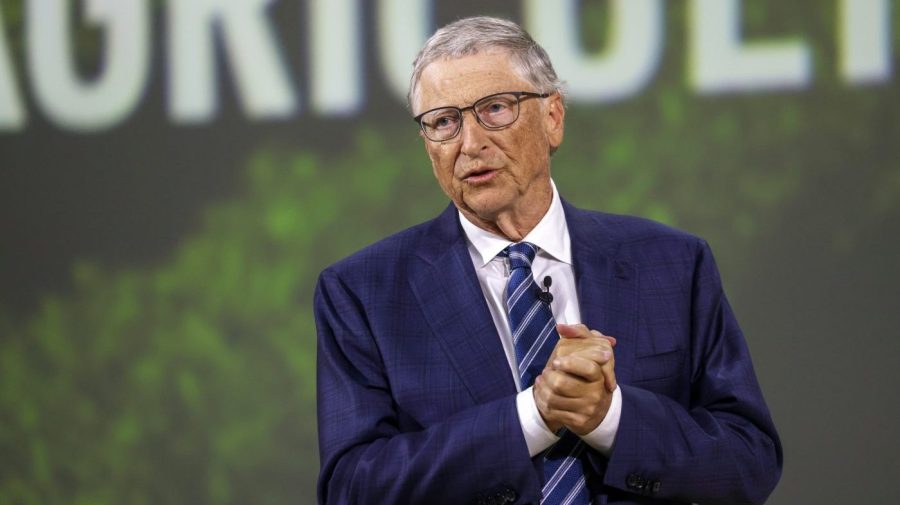The purposeful misinterpretation of Bill Gate’s climate message to world leaders

Last week, as world leaders prepared to attend the COP-30 climate talks, Bill Gates dropped a bomb, saying they are paying too much attention to reducing climate-altering pollution and too little attention to reducing human suffering.
Climate change “will not lead to humanity’s demise,” he wrote. “Our chief goal should be to prevent suffering, particularly for those in the toughest conditions who live in the world’s poorest countries.”
Gates’s message drew reactions from climate skeptics and activists alike. News outlets called it a “major climate change reversal,” and a “stunning claim.” Donald Trump claimed vindication. “I (WE!) just won the War on the Climate Change Hoax,” he posted on Truth Social. “Bill Gates has finally admitted that he was completely WRONG on the issue.”
No, he hasn’t. Gates did not downplay the importance of climate action; he downplayed the validity of climate alarmism. The problems with his missive are (1) a healthy amount of alarmism is justified, (2) he seemed to join Trump’s permission structure for backing away from climate action, and (3) he presented a false choice. We don’t have to choose between ending global warming and ending human suffering. The two issues coincide.
The World Health Organization (WHO) underscored this point a day after Gates issued his message. It warned that “continued overreliance on fossil fuels and failure to adapt to a heating world are already having a devastating toll on human health.”
“The climate crisis is a health crisis,” a WHO official said. “(C)limate inaction is killing people now in all countries. However, climate action is also the greatest health opportunity of our time. Cleaner air, healthier diets, and resilient health systems can save millions of lives now and protect current and future generations.”
While it’s true that unmitigated global warming won’t be the end of humanity — we are a resilient species — it will mean much more misery. Although many more lives will be lost, life itself will survive. Its quality will not.
Another recent warning underscores that point. Scientists say a climate tipping point has already begun, with the widespread death of coral reefs in the world’s oceans. Some 3 billion people depend on ocean health for their livelihoods.
Further, it is just not true that controlling fossil-fuel emissions distracts the international community from poverty, disease and other suffering. Climate stabilization is one of 17 United Nations Sustainable Development Goals that 193 countries adopted in 2015.The goals acknowledge that “ending poverty must go hand-in-hand with strategies that build economic growth and address a range of social needs, including education, health, social protection, and job opportunities, while tackling climate change and environmental protection.”
Unfortunately, the international community is not making sufficient progress on either the Paris Agreement or the sustainable development goals.
What should we do about these overlapping problems?
First, countries should continue developing the technologies and policies to decouple human progress from environmental degradation. The United States learned decades ago how to decouple energy consumption from economic development. By 2008, America generated twice as much GDP with the same amount of energy it used in 1975. Gross domestic product grew by 12 percent between 2007 and 2017, while total energy consumption fell by 3.6 percent.
Clean energy from limitless resources like sunlight and wind goes a step further. It decouples energy use from pollution, including greenhouse gases.
Researchers say we’ve also seen that economic growth can decouple from commodity use. America’s material consumption shifted significantly between 1900 and 2020, with “profound environmental, economic, and geopolitical implications” for all countries. Their study of 100 commodities used to build cities, power transportation and produce consumer goods showed the intensity of commodity use dropped around 1970. Some was due to shifting production to other countries, but recycling, changes in consumer behavior, new industrial practices and environmental regulations all played roles.
We should redouble efforts to retire fossil fuels from the global economy. After 30 years of international jawboning about emission reductions, fossil fuels still provide more than 80 percent of the world’s energy. And while there is growing interest in exotic fixes like reducing the amount of sunlight hitting the Earth rather than the amount of carbon we dump into the sky, exotic fixes have unintended consequences. They are examples of problem-switching rather than problem-solving.
Finally, we should shift the flow of resources from things that threaten life to things that improve it. Gates undoubtedly would agree. But we needn’t address poverty by stealing from pollution prevention. The world has abundant financial resources; they are just poorly used.
Global military spending hit a record $2.7 trillion last year. International fossil fuel subsidies totaled $7 trillion in 2022. Inefficient fossil fuel use wastes more than $4.6 trillion annually and contributes to global warming. And although the top 250 oil and gas companies should be investing in clean energy, they own less than 1.5 percent of the world’s renewable power capacity.
Bill Gates is correct to call for greater effort to alleviate human suffering. However, that neither requires nor justifies less effort to protect the atmosphere and the other environmental assets that support all life.
William S. Becker is co-editor of and a contributor to “Democracy Unchained: How to Rebuild Government for the People,” and contributor to “Democracy in a Hotter Time,” named by the journal Nature as one of 2023’s five best science books. He previously served as a senior official in the Wisconsin Department of Justice and is currently executive director of the Presidential Climate Action Project, a nonpartisan climate policy think tank unaffiliated with the White House.